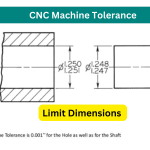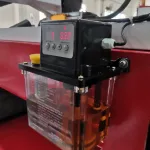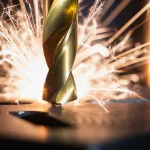The Revolution of CNC Friction Tapping: How Aerospace Manufacturing Was Transformed
CNC flow drilling tapping is tapping or cutting internal threads using CNC machines without cooling or lubricants. It relies on the heat generated from friction to cut threads. Since its introduction, CNC friction tapping has enormously impacted aerospace manufacturing, enabling faster, more efficient, and higher precision production of aircraft parts.
Table of Contents
A Speedier, Streamlined Process CNC Friction Drilling Tapping is faster than traditional tapping methods requiring cutting fluids. By removing the need to apply and remove cutting fluids, CNC Friction Drilling Tapping can tap up to 3 times faster than conventional tapping. That significantly accelerates the overall production of aircraft components. Eliminating cutting fluids also save time handling, preparing, and disposing of these chemicals. Workers can avoid obtaining, setting up, and cleaning cutting fluid systems, using that time for other productive work. The simplified process reduces wasted movements and downtime. When multiplied over the high volumes of aerospace production, the minutes saved translate to significant efficiency gains and cost reductions.
Aircraft parts can be manufactured with a smooth, uninterrupted workflow, minimizing excess activity and maximizing productivity. Unparalleled Precision and Quality CNC Friction Drilling Tapping produces higher quality, more precise threads. The heat softens the material, allowing for smoother, continuous cuts and a fine-grain structure with fewer flaws.
CNC machines are digitally controlled, enabling highly tight tolerances and accurate thread forms. Aerospace standards demand a degree of precision beyond typical requirements. CNC Friction Drilling Tapping achieves accuracies measured in thousandths of an inch, meeting the strict quality standards for aerospace. The parts produced are blemish-free, without residual cutting fluids that could contaminate or collect debris. These contaminants are absent, and the internal threads are ready to interface with mating components properly. The outcome is a final product of the highest integrity and reliability.
An Eco-Friendly Solution
CNC Flow Drilling Tapping is more environmentally friendly as no cutting fluids are used or wasted. It reduces pollution and the environmental impact associated with manufacturing. Cutting fluids demand proper handling, storage, and hazardous waste disposal, accumulating added costs and liability. By removing cutting fluids, CNC Friction Drilling Tapping minimizes environmental hazards and expenses. Many traditional cutting fluids contain toxic volatile organic compounds (VOCs) and pollutants. Exposure to these chemicals poses safety and health risks to machine operators and factory workers. CNC Friction Drilling Tapping avoids cutting fluids altogether, eliminating the dangers of these VOCs and contaminants.
The Future of Aerospace CNC Friction Drilling Tapping has transformed aerospace manufacturing through faster lead times, improved efficiency, maximum precision, and sustainability. While first allowing for quicker, more affordable production, CNC Friction Drilling Tapping has raised quality standards industry-wide and reshaped expectations of what is achievable. Its widespread integration demonstrates the benefits of advancing technology in line with environmental and social values.
CNC Flow Drilling Tapping has been instrumental in propelling aerospace to the forefront of automated, eco-friendly manufacturing. Continued productivity, quality, and sustainability progress is anticipated as CNC Friction Drilling Tapping becomes further optimized within integrated automation systems and intelligent factories. The revolutionary changes already brought by CNC Friction Drilling Tapping signal a bright future for aerospace manufacturing.
Global Impacts and Applications
The impacts of CNC Friction Drilling Tapping have extended globally, enabling major aerospace manufacturing hubs worldwide. CNC Friction Drilling Tapping in Europe has been crucial for producing Airbus aircraft and components across facilities in France, Germany, Spain, and the UK. Boeing depends on CNC Friction Drilling Tapping for efficient, high-volume manufacturing of commercial airplanes at its production sites in North America and China. CNC Friction Drilling Tapping has applications for producing all aircraft types, from commercial planes to fighter jets to helicopters and spacecraft. It is used in manufacturing structural components such as fuselages, wings, and engine parts and in detailed interiors, controls, and avionics.
The versatility of CNC Flow Drilling Tapping allows for threading a wide range of materials, from aluminum alloys to titanium to nickel superalloys. Advancing Military and Space Capabilities For the military aerospace sector, CNC Friction Drilling Tapping has been pivotal for developing new combat aircraft and defense technologies quickly and affordably. Fifth-generation fighter planes like the Lockheed Martin F-35 Lightning II rely on CNC Friction Drilling Tapping, enabling production and deployment worldwide. The technology has also been used in missiles, rockets, drones, and other military aircraft.
In space exploration, CNC Friction Drilling Tapping facilitates the construction of rockets, shuttles, satellites, and spacecraft. It allows for tapping components made of metallic and non-metallic materials that can withstand the extreme conditions of space travel and reentry into the Earth’s atmosphere. Friction tapping in this field requires achieving near-perfect precisions and quality levels to meet high-performance demands while maintaining flight safety.
The Future Outlook
All signs point to CNC Friction Drilling Tapping continuing to shape the direction of aerospace progress. Upcoming trends include:
- Further integrating CNC Flow Drilling Tapping into automated assembly lines and intelligent factory systems. That will optimize productivity, reduce costs, and allow for greater customization.
- Advancing CNC machine tooling and attachments to expand the applications of friction tapping. It could include threading a wider range of material types and part geometries.
- Developing specialized machine tools optimized specifically for friction tapping to achieve faster cycle times and higher precision. Purpose-built flow-drilling-tapping machines would maximize throughput and quality.
- Combining CNC Friction Drilling Tapping with other Industry 4.0 technologies like robotics,sensor systems, and data-driven analytics for a holistic, connected manufacturing environment. This smart ecosystem will enable a new level of speed, efficiency, and quality in aerospace production.
- Expanding lightweight, heat-resistant materials in flow drilling tapping to improve sustainability and energy efficiency. New alloys and composites will allow faster cycle times, reducing costs and environmental impact.
- Growing CNC Friction Drilling Tapping in the space sector to facilitate ambitious exploration missions and space tourism. It will require friction-tapping technology for tapping materials and parts engineered for space.
The future of CNC Friction Drilling Tapping in aerospace looks exceptionally bright. This revolutionary technology has already reshaped worldwide standards for productivity, precision, and environmental performance in aerospace manufacturing. Ongoing innovations in automation, materials, and digital connectivity will amplify these impacts, cementing CNC Friction Drilling Tapping as essential to the continued progress of aerospace in the 21st century and beyond.


